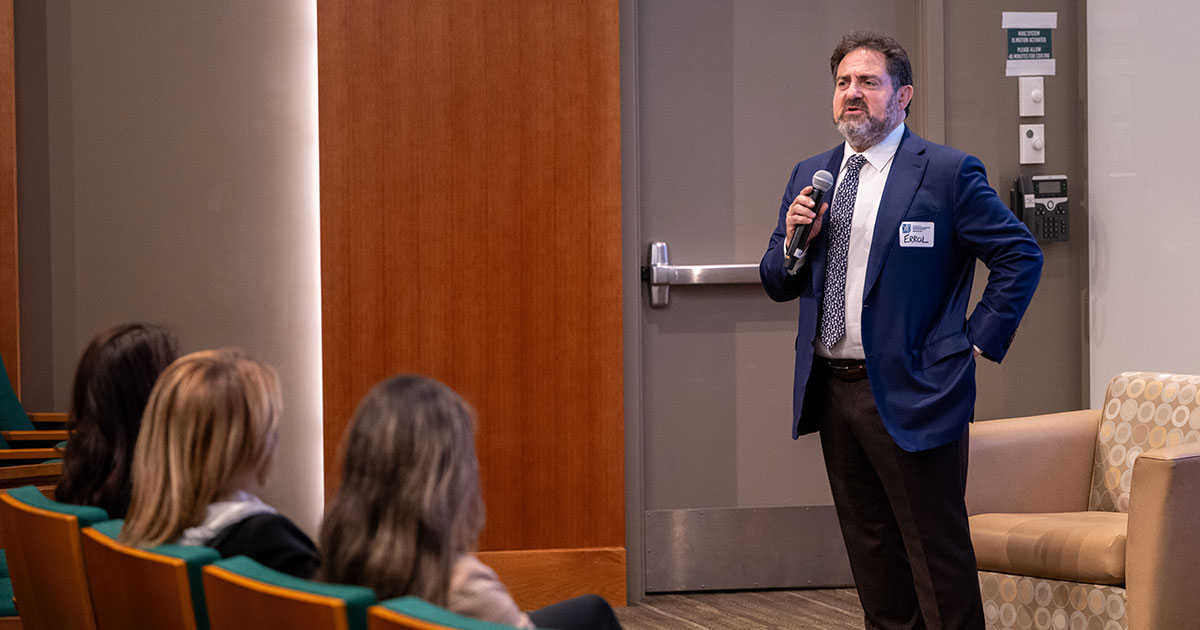How to Lead in a Crisis

In the midst of the present pandemic gripping the global community, my mind has raced back to research I conducted at the time of the 2009 global economic crisis. The lessons I gleaned from conversations with over 50 CEOs of small- and medium-sized companies may be relevant for those now forced to lead in a crisis.
5 Behaviors to Adopt in Order to Lead in a Crisis
We tend to think about leadership in a very positive context, but reality tells us that we are facing a tough downturn with significant social and economic impact. Looking back at research findings from the 2009 great recession, here are five leadership behaviors to adopt when leading in times of turmoil.
Over Communication
When times are tough, it’s important to over communicate with your team.
Be as visible and transparent with information and decisions as possible. Try to be open and positive but be realistic. For example, if business is down and you aren’t sure whether you’ll be able to keep everyone employed beyond the next three months, let people know that sales are off, impacting the organization’s cost structure, and that you hope to keep moving full steam ahead but will be reassessing where things stand at the end of the quarter.
Do your best to communicate as often as possible, both in person by video and using other means, but remember that the last thing you want to do is disappear from view. When leaders aren’t seen or heard from, that sends its own message, too.
- Be visible
- Transparency is essential
- Be open and positive but realistic
- Use high frequency and multiple modes
Focus
Stay focused on your goals as an organization.
Think carefully about the basics of what makes you successful and make sure you and your team are still accomplishing those outcomes. If not, consider what you can adjust.
You can learn a lot about that by talking with your customers and any key stakeholders, and you might learn even more by talking with your team. What are they seeing? How can you keep them focused? How can you enlist their assistance in this particular situation? As an entrepreneurial leader, you need to keep your eye on the prize, especially when the going gets tough.
- Connect with your customers and key stakeholders
- Back to basics – are you hitting your marks? What needs to change?
- Be attentive to your team
Patience
Tough times often come with a lot of uncertainty attached. When will the business cycle rebound? When will we get the next key investment or grant? What will happen to our customer or user base?
Do your best to model calm by staying proactive and developing your action plan. Embrace the ambiguity and make it your friend. Have an action plan but be prepared to pivot! Consider your contingencies in advance as best you can and revisit them as new data arrives. Modeling patience is about staying strategic with your priorities. As you do so, you remind others what the vision and the goals truly are, keeping them aligned and working to make it happen.
- Stay calm – embrace the ambiguity!
- Be proactive – get out in front of the problems
- Make a plan – and make a back-up plan
- Be strategic – keep your eyes on the prize!
Positivity
Leading with positive energy is one of the key tools of an entrepreneurial leader. Keeping your sunny side up can be infectious and it’s truly important in a challenging environment. Remember that others are watching you. If you’re down or pessimistic, they may think there’s little point to carrying on. On the other hand, when they see your optimism, they may give that extra effort. You may not always turn out to be right but even when that happens, you can pivot with poise and humility. Keep celebrating each win, and shoot for more things right than wrong. You can’t guarantee every outcome, but at least you’ll build your organization’s culture and enhance collaboration.
- Lead by example – stay positive
- Be a source of optimism and energy
- Set a positive direction – be decisive, be fair
- Pivot with poise!
- Celebrate the wins – even if they’re small, they matter!
Imagination
Tough times are a time to dig deep into your entrepreneurial leadership mindset.
What can you learn from the situation? How can you find a silver lining in the midst of what seems bleak? Tough times are an opportunity to reimagine and rethink the opportunity and the business model.
Sometimes, they present an opportunity to reorganize the way things are done, to reinvest in particular aspects of the work or to re-position the organization and its goals. As you do so, use your team and your stakeholders to help you see things in a new light. It may not be easy to do so but if you approach it with a learning mindset you may be surprised by the benefits you’ll discover.
- Re-imagine – look for the opportunity
- Re-think your business model
- Re-organize
- Re-position
- Re-invest
Self-care
Last, when times get tough don’t forget to take care of yourself as a leader. People will be watching you. Your ability to navigate change with optimism, use a learning mindset, pivot with poise, and maintain strategic priorities is crucial. Be sure to take a break from work and to connect with others. It’s important to be tough on the problems but not on yourself and to manage your stress from the situation.
- Be tough on the problems, not on yourself
- Work hard, but create some hard stops
- Attend to your stress
- Connect with others
- Model for others what it means to navigate change!
- The best leaders are learners – focus on getting more things right than wrong!
Navigating the current global adversity, and learning to lead in a crisis, is challenging at every level of our personal, social, and economic fabric. Hopefully, these lessons from the past offer you some ways to move ahead.



